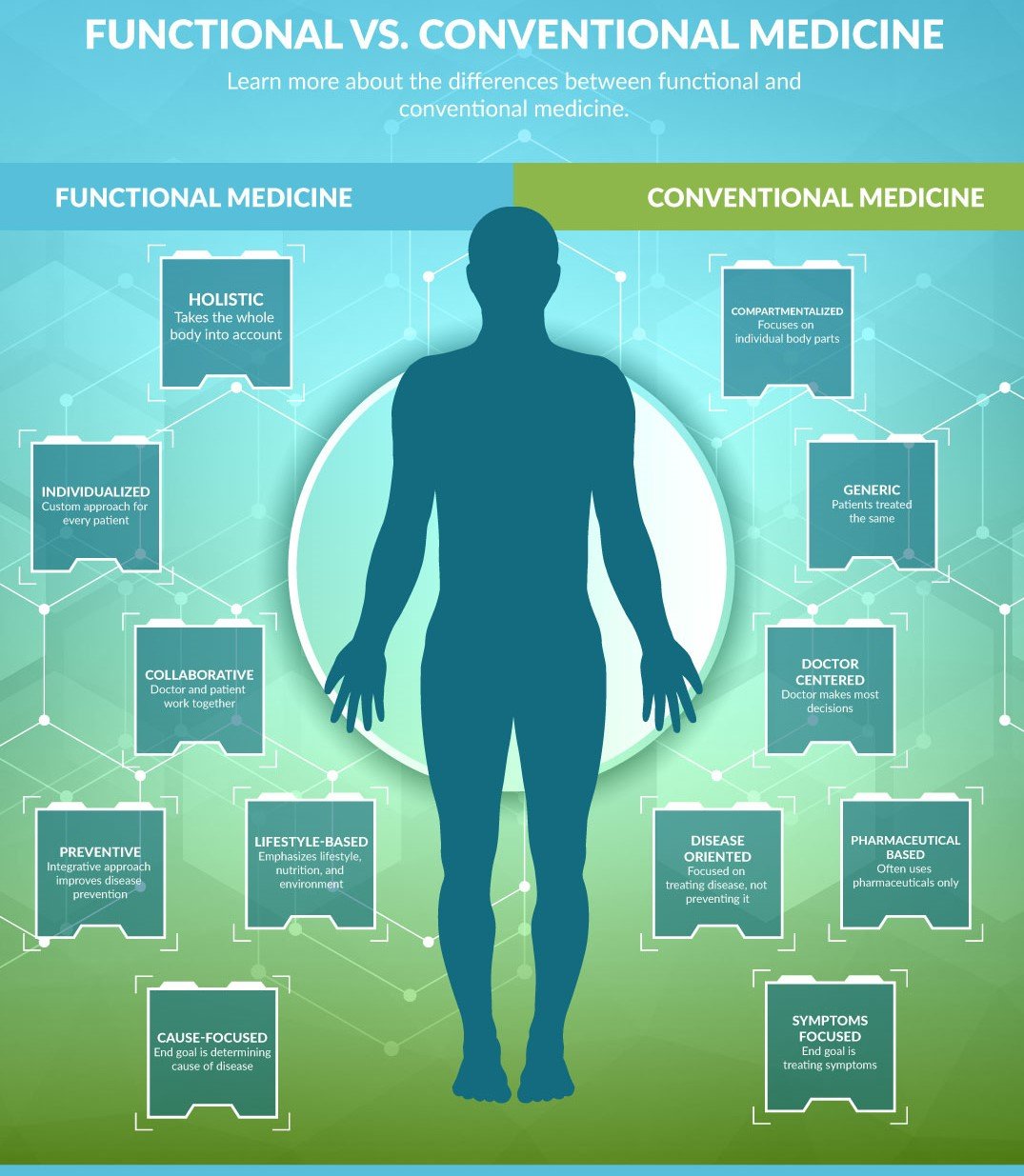Recognizing that there is common ground, bioregulatory medicine does not seek to dismiss conventional allopathic medicine - especially in the areas of emergency medicine or infectious disease. There are, however, fundamental differences in the “Weltanschauung”, or philosophical views, between the two.
Conventional allopathic medicine focuses on suppressing symptoms - labeling pathophysiological conditions (by their Latin names) according to symptomology. Bioregulatory and functional medicine instead focus on the root cause(s) underlying those symptoms.
Consider, for example, one of the most important biological processes: the body’s defense (immune) system. When stressed, injured, or affected by toxins, the immune system, in trying to correct the pathology, responds with inflammation. Conventional medicine would classify the condition according to its symptom (in Latin “itis” means “inflammation”), e.g., dermatitis (“inflammation of the skin”), tendonitis (“inflammation of the tendon”), and seek to suppress the manifesting symptom. Bioregulatory and functional medicine would instead seek the root cause(s) of that inflammation - be it poor kidney function, food sensitivity, or problems at home (or a combination thereof).
Moreover, conventional allopathic medicine suppresses those symptoms via a pharmaceutical approach, using patented chemical agents that suppress the body’s regulatory mechanisms. Extensive pharmaceutical efforts have been made with the development of powerful “anti-agents” to fight against the inflammation or fever, to reduce or suppress the symptom, but in so doing, they also reduce the immune system’s regulatory response to the toxic insult on the body, causing further dysregulation. In short, instead of improving the body’s defense mechanisms, many pharmaceuticals interfere with and lessen cellular immunity.
Whereas conventional medicine is primarily chemically oriented (relying on pharmaceuticals), bioregulatory medicine is biologically oriented, aiming to eliminate symptoms by activating and restoring the body’s own intrinsic healing mechanisms. The causative factors of illness (both physical and nonphysical) are addressed, using non-toxic treatments, such as nutrition and lifestyle improvements, exercise, nutritional supplementation, herbal approaches, psycho-emotional therapies, oxidative therapy, light, sound, and frequency therapy, hyperthermia, acupuncture, and numerous other biologically oriented approaches.
Conventional allopathic medicine seeks simple, linear relationships between medicinal (chemical) agents and their desired effects. The more linear the relationship, the easier it is to measure, and therefore, the more “scientific” it is considered (within the allopathic paradigm). Bioregulatory medicine resists such reductionist thinking. Biological systems are complex and need to be examined - not in isolated pieces, but in an integrated, holistic system. Bioregulatory medicine, therefore, does not seek to isolate and treat a symptom, but instead, to treat the overall physical, mental, and spiritual health of the patient.
In other words, conventional allopathic medicine treats disorders; those disorders are categorized via diagnostic code numbers for the administration of generalized (“cookie-cutter”) treatment modalities. Bioregulatory medicine treats individuals, considering each person’s unique biochemical, energetic, structural, sociological, and/or psycho-emotional patterns. Therapeutic protocols are individually tailored to resolve one’s unique set of causative factors. This is an integrated, multi-level approach (evaluating such factors as biochemical individuality, genomic propensity, and functional metabolic processes, together with bioenergetic testing and regulatory diagnostics).
One final note: bioregulatory medicine, a holistic system of healthcare with a focus on natural biological remedies and therapies, is not to be confused with what the pharmaceutical industry is now marketing as “biological medicine”. While these pharmaceuticals may have originally been derived from biological sources (human, animal, or microorganism), many of these drugs have since been altered (to be patented and marketable), rendering them foreign agents in the body, which may cause severe side effects and/or damage immunity and organ function. Because they are profitable to the pharmaceutical industry, these pharmaceuticals continue to be researched, manufactured, and marketed. The term biological medicine makes them sound natural and harmless, but they are not.
https://www.biologicalmedicineinstitute.com/basic-tenets


